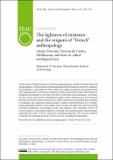| dc.contributor.author | Fischer, Michael M. J. | |
| dc.date.accessioned | 2015-03-13T13:59:04Z | |
| dc.date.available | 2015-03-13T13:59:04Z | |
| dc.date.issued | 2014-06 | |
| dc.identifier.issn | 2049-1115 | |
| dc.identifier.uri | http://hdl.handle.net/1721.1/96009 | |
| dc.description.abstract | Latour turns to Wittgensteinian or Lyotardian language games, and Silversteinian deixis and metapragmatics, as formal means of distinquishing modern European discursive categories and institutions, each defined by three criteria: the right pre-position, discontinuity from other language games, and felicity conditions. Double-click and the snake of knowledge are metaphorical reminders to not efface the labor of invention and maintenance. In lectures on Gaia, Latour turns toward a Durkheimian politics of the Anthropocene. Descola charts Siberian and North American groups on a north–south historical gradient from animism to analogism, and Amazonian cultural groups as animist transformational sets, reviving a human geography tradition, connecting to Latour’s project through wide-mesh networking of human–nonhuman cosmo-logical modes and relations, and contesting Viveiros de Castro’s uniform Amazonian predation cosmology and multinaturalism–uniculturalism, supporting the earlier work on contrastive Amazonian linguistics. We need not celebrate “humanity as technological detour,” but focus on the “peopling of technologies.” | en_US |
| dc.language.iso | en_US | |
| dc.publisher | HAU Network of Ethnographic Theory, University of Edinburgh, Department of Anthropology | en_US |
| dc.relation.isversionof | http://dx.doi.org/10.14318/hau4.1.018 | en_US |
| dc.rights | Creative Commons Attribution-Noncommercial-No Derivative | en_US |
| dc.rights.uri | http://creativecommons.org/licenses/by-nc-nd/3.0/ | en_US |
| dc.title | The lightness of existence and the origami of “French” anthropology: Latour, Descola, Viveiros de Castro, Meillassoux, and their so-called ontological turn | en_US |
| dc.type | Article | en_US |
| dc.identifier.citation | Fischer, Michael M. J. “The Lightness of Existence and the Origami of ‘French’ Anthropology: Latour, Descola, Viveiros de Castro, Meillassoux, and Their so-Called Ontological Turn.” HAU: Journal of Ethnographic Theory 4, no. 1 (June 23, 2014): 331. | en_US |
| dc.contributor.department | Massachusetts Institute of Technology. Program in Science, Technology and Society | en_US |
| dc.contributor.mitauthor | Fischer, Michael M. J. | en_US |
| dc.relation.journal | HAU: Journal of Ethnographic Theory | en_US |
| dc.eprint.version | Final published version | en_US |
| dc.type.uri | http://purl.org/eprint/type/JournalArticle | en_US |
| eprint.status | http://purl.org/eprint/status/PeerReviewed | en_US |
| dspace.orderedauthors | Fischer, Michael M. J. | en_US |
| dc.identifier.orcid | https://orcid.org/0000-0002-2871-5943 | |
| mit.license | PUBLISHER_CC | en_US |
| mit.metadata.status | Complete | |
